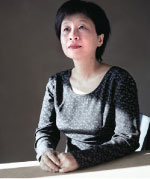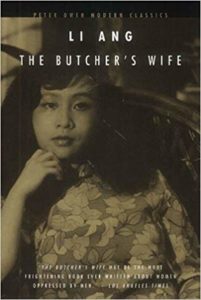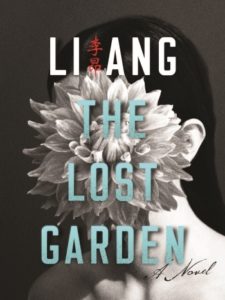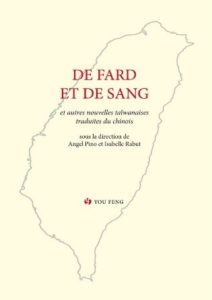 Li Ang is a Taiwanese writer known abroad, but the translations into French and English only give a very limited idea of her fifty years of literary activity. This is especially the case for her short stories, which will be examined in connection with her career by reserving the three translated novels (3,4,5) for a future article.
Li Ang is a Taiwanese writer known abroad, but the translations into French and English only give a very limited idea of her fifty years of literary activity. This is especially the case for her short stories, which will be examined in connection with her career by reserving the three translated novels (3,4,5) for a future article.
– A childhood in Lugang and the first controversies:
Lugang was one of the most important cities in Taiwan before declining following the silting up of its port. Away from the rail and road networks, which favoured the preservation of its architecture and social life, which plays an important role in Li Ang’s work.
She was born in 1952, her family is very wealthy, which will allow her to be financially independent. Her two older sisters are already published, which encourages her to write at a very young age. At sixteen, she published ” Flower Season” (1), a short story that created a lot of reactions.
A young girl skips school and wants to buy a Christmas tree. The florist drives her on his bicycle to his plantation in the mountains. She is worried, “I fear that he would grab me and drag me into the dense sugarcane field where he would rip the clothes of me”. But, “nothing, nothing at all had happened. But had I really hoped for something to happen? I wasn’t even sure about that myself”.
The mastery of narrative is remarkable and the influence of Freudism and Western narrative techniques is very clear. It should not be forgotten that the Guomintang had banned contemporary Chinese literature considered communist. Li Ang is only in contact with traditional Chinese culture in high school, but, like other intellectuals, she turns to the West: realism, existentialism, Freud, theory of the stream of consciousness…” The combined influence of Chinese culture and Western thought represents Taiwan’s historical reality, there is nothing negative about it, nor in the signs of fifty years of Japanese colonization” (p. 286-6).
In 1970, Li Ang attended philosophy courses at the Chinese Culture University in Taipei and wrote short stories about university sexuality and social pressure. One story is quite surprising, “Curveous Dolls” (2), published in 1969.
These “big” dolls are the ones a little girl has never had. She makes them with rags, she tells it to her husband who laughs at her. A woman with large breasts touches her in the bus; she  dreams of these breasts and if only her husband could have similar ones… She tells her dreams and obsessions to her husband who is worried. She finds a wooden doll with breasts too… A completely surrealist story written at eighteen!
dreams of these breasts and if only her husband could have similar ones… She tells her dreams and obsessions to her husband who is worried. She finds a wooden doll with breasts too… A completely surrealist story written at eighteen!
– The return to Taipei and “The Butcher’s Wife”:
In 1975, she studied drama in the United States at the University of Oregon. Then she spent six months in California and met the great writer Bai Xianyong in Los Angeles. In Taipei, she is a teacher, writes many short stories and publishes a regular column entitled “Women’s Opinion” in China Times.
In 1983, the publication of ” The Butcher’s Wife ” (3) created a scandal, a rift with her father but was awarded with the United Daily prize. A very violent theme that challenges patriarchal structures: the descent into hell of a victim, an orphaned woman, sold in marriage to a butcher who undergoes his violence and who will end up killing and cutting him up as he does with pigs.
A novel that made a lot of impact abroad and was quickly translated into English by Howard Goldblatt and later, in 1992, into French.
– Sex and power:
With “Nuit Obscure” (4) in 1985, she touches another taboo: a woman cheats on her husband and assumes it. Cynicism and hypocrisy of the different characters who are mainly sketches. An external moralist makes it possible to facilitate the process and transitions but does not bring any dramatic progression into the work.
 ” The Lost Garden ” (5) in 1990 takes us into another world. A beautiful book that does not have the strength and violence of ” The Butcher’s Wife” but is much more complex and in very different atmospheres. Three years after the lifting of martial law, the novel goes back to the White Terror, to the story of a family that owns a beautiful garden in Lugang. The characters, Rose, her father, her lover Lin Xigeng, are fascinating. They are going through the history of Taiwan.
” The Lost Garden ” (5) in 1990 takes us into another world. A beautiful book that does not have the strength and violence of ” The Butcher’s Wife” but is much more complex and in very different atmospheres. Three years after the lifting of martial law, the novel goes back to the White Terror, to the story of a family that owns a beautiful garden in Lugang. The characters, Rose, her father, her lover Lin Xigeng, are fascinating. They are going through the history of Taiwan.
A very clever composition between the family’s past and Rose’s present. Regrets for a Taiwan that has disappeared. A book that shows us the complexity of Taiwanese culture and its many contributions as well as Li Ang’s desire to build an autonomous literature in Taiwan that is not controlled by authors from the continent.
– Li Ang and politics:
She has always been in resistance against the Guomindang, but even for “The Butcher’s Wife” has not suffered from censorship; it is her private life that will create the biggest problems. Shih Ming-teh, a playboy, who was once President of the opposition DPP party, became Li Ang’s lover when he was released from prison; a tumultuous relationship all the more so as he quickly cheated on her. But a media battle with her rival Sissy Chen was not good for the image of both women.
In 2000, Li Ang published “Autobiography, a novel” (not translated) on the life of the revolutionary and feminist Xie Xuehong. The topics of power, gender and politics were not really new in 2000 and the book was not very successful.
 Li Ang constantly returns to politics with “De Fard et de Sang” (7), a remarkable novella inspired by the incident of February 28, 1947, which deeply divided ethnic Taiwanese and “Continentals” and which has recently been mentioned.
Li Ang constantly returns to politics with “De Fard et de Sang” (7), a remarkable novella inspired by the incident of February 28, 1947, which deeply divided ethnic Taiwanese and “Continentals” and which has recently been mentioned.
A short story translated into English and French (8), ” Beef Noodles “, is worth a look. Beef noodles are one of Taiwan’s favourite dishes that is unfortunately difficult to find in Paris.
A political dissident, sentenced to life imprisonment, after 23 years in prison, has a strong desire for a dish of beef noodles. As his family gives him some money, he can order some. The inmate in the cell opposite looks at him with greed and he thinks that he should have asked for a bowl for him also and he promises himself to do so. The next day, this companion left his cell to be shot…
Li Ang explains the variants of the dish, pure stewed beef or roasted beef; she mentions the taste of the continental people for chilli; she describes them as “the northern population, who came from the distant Chinese continent when they crossed the Taiwan Strait to govern us” (p. 124).
Since the 2000s, Li Ang has devoted herself to gastronomy, a passion she shared with her father, and has visited many starred restaurants, including in France. But it goes further and a novel published in 2007 deals with the links between politics, sex, food and relationships in the couple.
She, who devoted her life to the struggle of women, never married: “All love fades in time and all lovers become boring; only writing can be an eternal love…The reason I am still single may be that I can’t find a husband who’s as good as writing” (9).
Bertrand Mialaret
(1) Li Ang, “Flower Season”, translated by Howard Goldblatt (p.125 to 133) in “Bamboo Shots after the rain” edited by Ann C. Carver. The Feminist Press. New York 1990, 230 pages.
(2) Li Ang, “Curvaceous Dolls”, translated by Howard Goldblatt p. 360 -372 in The Columbia Anthology of Modern Chinese Literature, edited by Joseph S. M. Lau and Howard Goldblatt. Columbia University 1995, 720 pages.
(3) Li Ang, “La femme du Boucher”, translated by Alain Peyraube. Flammarion 1994, 200 pages. (In English, “The Butcher’s Wife” translated by Howard Goldblatt. Peter Owen, 2002).
(4) Li Ang, “Nuit Obscure”, translated by Marie Laureillard, Actes Sud 2004, 190 pages.
(5) Li Ang, “Le Jardin des Egarements”, translated by André Lévy. Editions Philippe Picquier 2003, 270 pages. (In English, “The Lost Garden”, translated by Sylvia Li Chun-lin and Howard Goldblatt. Columbia University 2015, 236 pages).
(6) Li Ang, “La modernisation et l’occidentalisation à Taiwan” p.277-283 in “Écrire au Présent” under the direction of Annie Curien. Maison des Sciences de l’Homme; 2004, 330 pages.
(7) Li Ang, “De Fard et de Sang” and other Taiwanese short stories, under the direction of Angel Pino and Isabelle Rabut. You Feng 2018, 460 pages. The novella (p.213-285) is translated by Melie Chen.
(8) Li Ang, “Pour un bol de nouilles au boeuf” (p.119-131) translated by André Lévy in Alibi, Maison des Sciences de l’Homme, 2004 (in English, “Beef Noodles” translated by Sylvia Li-Chun-lin in Chinese Literature Today volume 2.1 ; 2012).
(9) Li Ang, “Protest of a writer against wreckless accusations” (p.257) in “Écrire au Présent”, edited by Annie Curien; MSH 2004, 330 pages.





